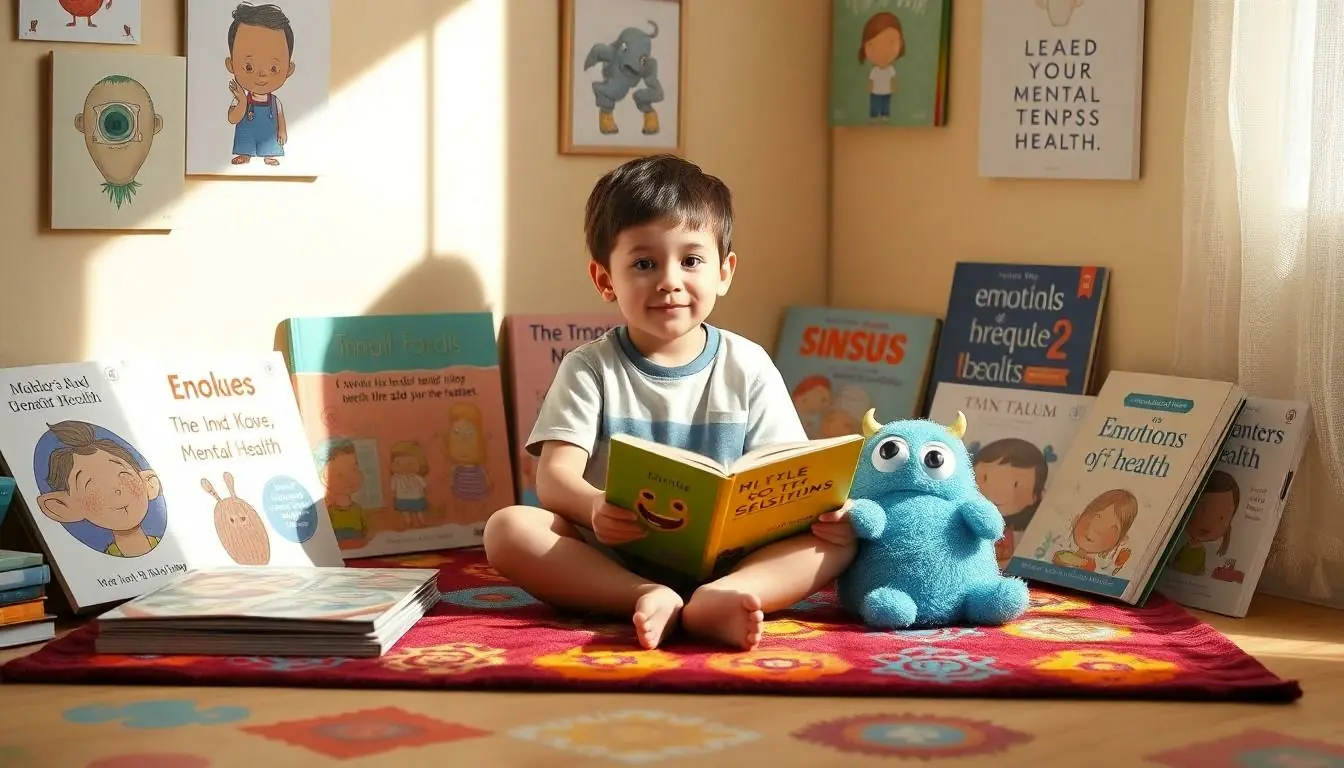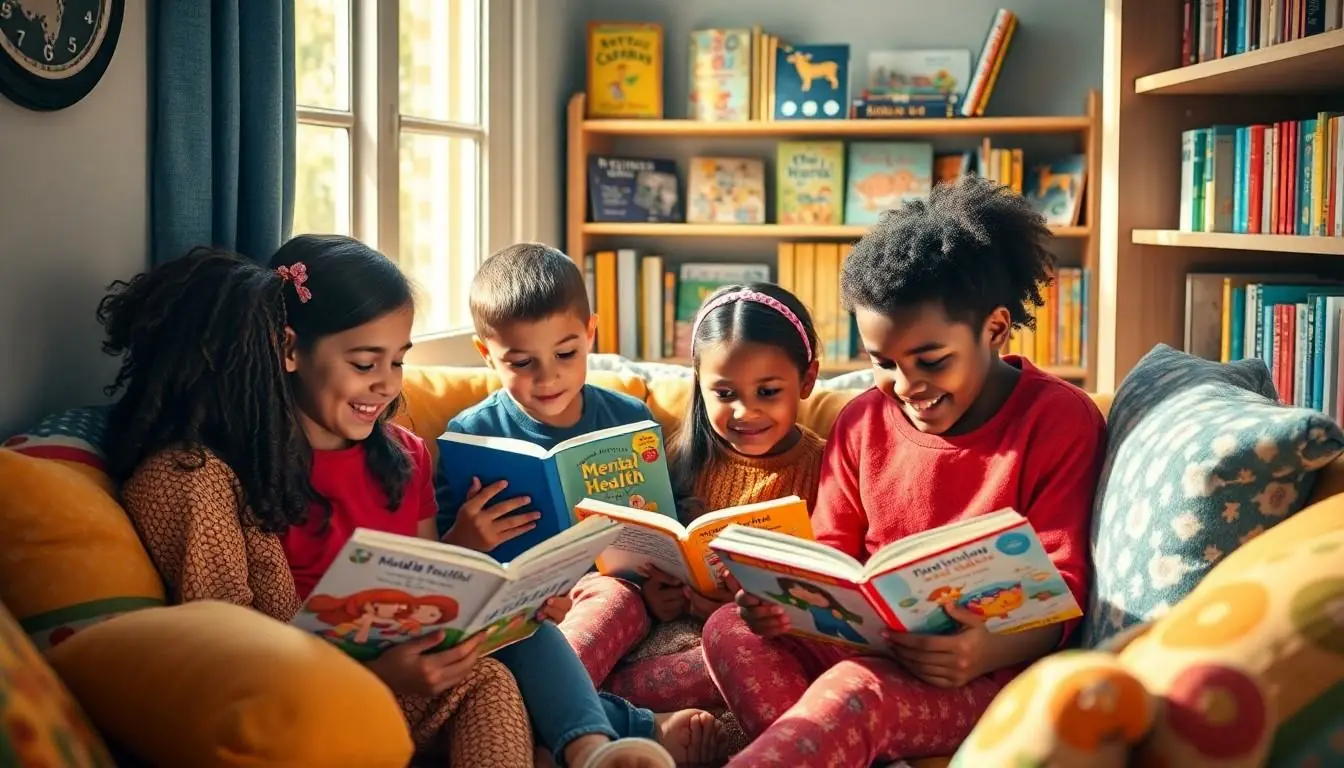In a world where kids face pressures that would make even adults cringe, mental health books for kids are like a superhero cape for their emotional well-being. These books don’t just entertain; they empower young minds to understand their feelings, tackle anxiety, and navigate the ups and downs of growing up. Imagine a colorful story that teaches a child how to turn a frown upside down—it’s like giving them a secret weapon against life’s little curveballs.
With the right mental health book, kids can learn to express themselves, build resilience, and even find humor in their struggles. It’s not just about reading; it’s about sparking conversations that can change lives. So why not dive into this treasure trove of wisdom and laughter? After all, a well-equipped child is a happier child, and who wouldn’t want that?
Table of Contents
ToggleImportance Of Mental Health Books For Kids
Mental health books for kids are vital for their emotional development. These resources provide tools for understanding feelings and navigating everyday challenges.
Benefits Of Early Mental Health Awareness
Early mental health awareness offers numerous advantages for children. Children exposed to mental health concepts gain skills to recognize their emotions. Research indicates that early intervention reduces anxiety and depression rates. Furthermore, children learn coping mechanisms to manage stress effectively. The sooner kids understand mental health, the better equipped they become to handle life’s challenges. Developing emotional intelligence leads to healthier relationships and enhanced self-esteem.
How Books Can Help Children Express Emotions
Books serve as excellent mediums for helping children articulate their feelings. Engaging stories introduce characters facing similar issues, showing children they’re not alone. These narratives inspire self-reflection and dialogue about emotions. Reading about others’ experiences can validate feelings and foster empathy. Furthermore, books provide a safe space for exploring complex emotions in an accessible way. Discussing stories with caregivers enhances understanding and communication skills, benefiting children’s emotional expression.
Recommended Mental Health Books For Kids

Mental health books for kids provide valuable insights into emotions and resilience. The following selections capture essential themes in an engaging manner.
Picture Books For Young Readers
“Hey, That’s My Monster!” by Amanda Noll introduces children to concepts of fear and imagination through a playful monster encounter. “The Invisible String” by Patrice Karst gently addresses separation anxiety, encouraging kids to think of connections even when apart. “A Little SPOT of Anxiety” by Diane Alber offers relatable characters who face everyday worries, creating opportunities for discussions about feelings. “You’re Finally Here!” by Mélanie Watt uses humor to convey messages of belonging and happiness, presenting difficult emotions in a light-hearted manner.
Chapter Books For Older Kids
“The 100-Year-Old Secret” by Tracy Barrett mixes mystery with themes of anxiety and friendship, allowing readers to explore complex feelings alongside engaging narratives. “Wonder” by R.J. Palacio considers bullying and acceptance through the journey of a boy with facial differences, saluting kindness and empathy. “The Journal of Best Practices” by David Finch, although geared toward a slightly older audience, provides insights into living with obsessive-compulsive disorder, framed within relatable anecdotes. “Fish in a Tree” by Lynda Mullaly Hunt encourages resilience and understanding of learning differences, promoting discussions around self-acceptance and strengths.
Themes Covered In Mental Health Books
Mental health books for kids address a variety of themes that promote emotional well-being and resilience. These themes provide young readers with tools to navigate their feelings and improve their mental health.
Anxiety And Stress Management
Anxiety and stress management are crucial topics covered in many children’s books. Stories often portray characters experiencing anxiety, helping kids recognize and understand their own feelings. These narratives provide coping strategies, such as breathing techniques or mindfulness exercises. Engaging illustrations further simplify these concepts, making them relatable. For example, “A Little SPOT of Anxiety” introduces everyday worries, helping children identify their stressors and develop healthy responses. Addressing these themes early fosters a proactive approach to mental health.
Building Self-Esteem
Building self-esteem forms a key theme in several mental health books for young readers. Such books encourage children to embrace their individuality and cherish their unique strengths. Characters often face challenges but ultimately learn valuable lessons about self-acceptance and personal growth. “Fish in a Tree” highlights the journey of a girl overcoming learning difficulties, showcasing the importance of resilience and believing in oneself. Positive affirmations and relatable characters remind children that they are not alone in their struggles, reinforcing their self-worth.
Developing Empathy And Social Skills
Developing empathy and social skills is another central theme in mental health literature for kids. These books encourage understanding and compassion towards others. Characters navigate social scenarios, helping young readers identify various emotions and perspectives. For instance, “Wonder” addresses bullying and acceptance, prompting discussions about kindness and inclusivity. By witnessing these interactions, children enhance their ability to empathize with peers. Such narratives promote healthy relationships and support social development, crucial for emotional growth.
Tips For Parents And Educators
Selecting suitable mental health books for children enhances emotional awareness. When considering titles, look for stories that align with a child’s age and experiences. Age-appropriate themes support comprehension. Picture books feature simple narratives, while chapter books delve into more complex issues. Seek stories that portray diverse emotions, as this fosters empathy and connection.
Choosing The Right Books
Identifying the right mental health books requires attention to a child’s needs. Choose books with relatable characters to help bridge emotional understanding. Research recommendations from mental health professionals and educators. Popular titles like “A Little SPOT of Anxiety” address everyday worries effectively. Look for positive messages that promote resilience and self-acceptance. Include books that encourage discussions about feelings and interpersonal relationships. Availability of varied genres ensures that every child finds something engaging.
How To Facilitate Discussions About Mental Health
Engaging children in conversations about mental health deepens understanding. Start discussions by asking open-ended questions about the stories they read. Encourage them to share their feelings and opinions on characters’ experiences. Utilize examples from the books to illustrate emotions, making topics more relatable. Normalize discussions by expressing that everyone experiences feelings. Create a safe environment where children feel comfortable sharing. Model emotional language during these discussions to enhance vocabulary and understanding. Regular dialogues about mental health foster ongoing awareness and emotional growth.
Mental health books for kids play a vital role in shaping their emotional landscape. By introducing essential concepts in a relatable way, these stories empower children to navigate their feelings and develop resilience. They not only validate experiences but also encourage empathy and understanding among peers.
As children engage with these narratives, they gain valuable tools for communicating their emotions and coping with life’s challenges. Parents and educators can further enhance this journey by fostering open conversations about the themes presented in these books. Investing time in mental health literature is an investment in a child’s emotional well-being, equipping them for a healthier future.



